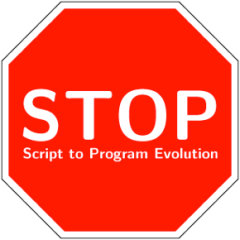 |
Welcome to the 5th Script To Program Evolution Workshop |
In recent years there has been increased interest in scripting languages, the migration from scripts to large programs, and the interplay between typed and untyped code. New languages such as TypeScript, Hack, Dart, Typed Racket, and GradualTalk, to name a few, have begun to explore the integration of dynamic and static typing within the same language.
Scripting languages are lightweight, dynamic programming languages designed to maximize productivity by offering high-level abstractions and reducing the syntactic overhead found in most system’s languages. The rising popularity of scripting languages has many underlying causes: they allow partial execution of programs, permitting easy unit testing, interactive experimentation, and even demoing of software at all times; their support for powerful and flexible high-level datatypes and dynamic typing admits quick interim solutions that can later be revised; etc. In short, scripting languages optimize developement time rather than machine time, a good approach early in the software development life cycle.
However, once the understanding of the system has reached a critical point and requirements have stabilized, scripting languages become less appealing. The compromises made to optimize development time make it harder to reason about program correctness, harder to do semantic-preserving refactorings, and harder to optimize execution speed. The lack of type information makes the code harder to navigate.
The concept of gradual typing has been proposed, in which the programmer controls which portions of the program are dynamically typed and which portions are statically typed. Over the last decade there has been significant progress on the theory and practice of gradual typing, but there are still many open questions and unexplored points in the design space.
Accepted Papers
Call for Contributions
Scope
The STOP workshop is interested in the evolution of scripts, in the sense of untyped pieces of code, into safer programs, with more rigid structure and constrained behavior through the use of gradual typing, contract checking, extensible languages, refactoring tools, and the like. The goal is to further the understanding of such systems in practice, and connect practice and theory. This workshop aims to bring researchers together from academia and industry for passionate discussion about these topics, and to promote not only the theory, but practical evalution of these ideas, and experience reports.
Proceedings
The accepted papers will be distributed at the workshop in an informal proceedings. All accepted submissions shall remain available from the workshop web page.
Submission Guidelines
Abstracts, position papers, and status reports are welcome. Papers should be 1-2 pages (excluding references) in standard ACM SIGPLAN format. All submissions will be reviewed by the program committee. Submit your papers on EasyChair when the link becomes available!
New this year: system demos. Developers of languages, tools, etc. are invited to submit a 1-page description of their system, along with links to a runnable version and one relevant small or medium sized example program that demonstrates its use. At the workshop we hope to have system developers demonstrate their systems and trade example programs.
Sun 17 JulDisplayed time zone: Amsterdam, Berlin, Bern, Rome, Stockholm, Vienna change
08:45 - 09:45 | |||
08:45 10mDay opening | Opening remarks STOP | ||
08:55 50mTalk | Types for Ruby STOP Jeffrey S. Foster University of Maryland, College Park | ||
10:05 - 12:25 | |||
10:05 50mTalk | Optional Typing in Dart: Purity and Practice STOP Gilad Bracha Google Pre-print | ||
10:55 30m | Beyond Types: Extending the Gradual Guarantee STOP James Noble Victoria University of Wellington, Michael Homer Victoria University of Wellington, Timothy Jones Victoria University of Wellington, Sophia Drossopoulou Imperial College London, Andrew Black Portland State University, Kim Bruce Pomona College Link to publication | ||
11:25 30m | Gradual Typing for Delimited Continuations STOP Link to publication | ||
11:55 30mTalk | Automating Gradual Typing STOP Timothy Jones Victoria University of Wellington Link to publication File Attached | ||
13:50 - 15:20 | |||
13:50 50mTalk | Gradual types for real-world objects STOP Jan Vitek Northeastern University | ||
14:40 30m | A Systematic Performance Evaluation of Gradually Typed Functions and References STOP Andre Kuhlenschmidt Indiana University, Deyaaeldeen Almahallawi Indiana University, Jeremy G. Siek Indiana University | ||
16:00 - 16:40 | |||
16:00 30m | From Optional to Gradual Typing via Transient Checks STOP | ||
16:30 10mDay closing | Closing remarks STOP | ||
Invited Talks
Jeff Foster, University of Maryland
Gilad Bracha, Google
Jan Vitek, Northwestern University
More details coming soon….